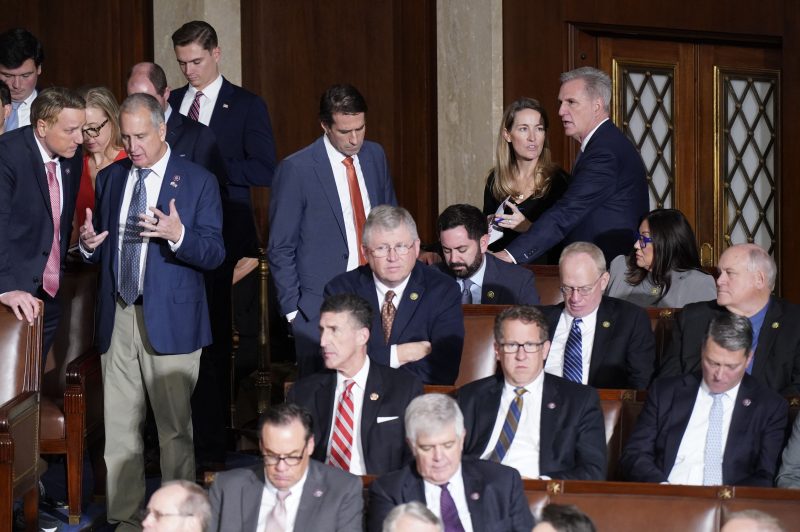Okay, so here’s where we are.
Rep. Kevin McCarthy (R-Calif.) got elected speaker after failing to get a majority on 14 prior votes. That was back in January, and securing that victory included adding a kill switch to his tenure, which Rep. Matt Gaetz (R-Fla.) flipped earlier this month. McCarthy lost his job, forcing his party to start over.
House Majority Leader Steve Scalise (R-La.) was next in line behind McCarthy, so, naturally, his bid didn’t even make it to a vote on the floor. Rep. Jim Jordan (R-Ohio) is a bomb-thrower more comfortable with Fox News hits than writing bills, so, naturally, his did. But he couldn’t close the deal either. The House Republican caucus finally took him out of contention Friday.
So the party starts over, back where it was in January but with no obvious candidate for the top position in the chamber. The result is that nine different Republicans have declared their interest in the job, manifesting the emotional core of the caucus: Everyone wants power, but no one so far has proved particularly effective at wielding any.
The search for the next House speaker
End of carousel
It’s been useful to present the speaker fight visually, as we’ve done regularly over the past few weeks. So we do so again, using measurements of the caucus’s ideology (using DW-NOMINATE scores from Voteview) and the way their districts voted in 2020 (using analysis from Daily Kos).
What you can see is that, while Jordan was one of the most ideologically extreme members of the caucus, most of the nine new contenders for the position sit closer to the middle of the caucus. (That “of the caucus” is critically important here, of course; the House Republican caucus is very conservative, so sitting closer to its middle is a bit like enjoying a balmy 85-degree day in a month of triple-digit temperatures.)
In fact, the average ideology and 2020 vote in the districts of those seeking the position sits fairly close to the average of the caucus overall. Speaker candidates are a bit more conservative on average and represent slightly less Donald-Trump-friendly districts, but only subtly on both points.
Importantly, each of the nine Republicans seeking to be elected speaker voted in support of Jordan’s bid on each of last week’s three ballots. You can see that most of them fall within the ideological range of those who voted against Jordan at least once, a range that encompasses much of the least-conservative, Joe-Biden-voting districts in the caucus. But while Jordan is more conservative than each of those nine, all of them supported him on all three ballots.
That’s not true of the votes for McCarthy in January. Eight of the nine backed McCarthy on all 15 ballots. The exception was Rep. Byron Donalds (Fla.), who himself earned a few votes for the position back then. Donalds is generally aligned with the group of legislators that has consistently caused friction from the caucus’s fringe-right flank.
If we overlap the anti-Jordan and anti-McCarthy votes, we see that six of those seeking the speakership sit within the area where those two positions overlap. These are legislators who sit close to the opponents of each of the two leading speaker candidates — groups of opponents who represent the two sides of the caucus, the more- and less-extreme sides. They sit, in a way, at the center of a sort of speaker Venn diagram.
Two legislators sit outside this range — Reps. Jodey Arrington (Tex.) and Dan Meuser (Pa.) — mostly because their districts were more Trump supportive in 2020 than the rest of the caucus.
The new candidates for the speakership also generally share another quality with the rest of their caucus: They voted at least once to reject electors submitted in support of Joe Biden during the counting of electoral votes that began on Jan. 6, 2021.
Only two — Majority Whip Tom Emmer (Minn.) and Rep. Austin Scott (Ga.) — didn’t vote to reject those electors. Which is not to say that they weren’t sympathetic to Trump’s efforts to overturn the election; Emmer, for example, offered his support for a lawsuit that would have even more broadly upended the election results. Scott was included on The Washington Post’s list of election deniers running in 2022.
You can see the pattern here. The Republican caucus will consider a clutch of speaker candidates who largely (though not entirely) sit between Jordan and McCarthy ideologically and (in terms of their districts) politically. Candidates who have been in general accordance with the will of the caucus majority on the votes for McCarthy and Jordan. And candidates who have also been in accordance with the majority’s rejection of the results of the 2020 election.
If this year has taught us anything, though, it’s that one should not rush to make any predictions about how the Republican vote to elect a speaker will turn out.





























